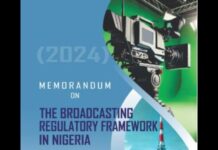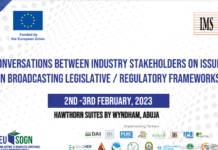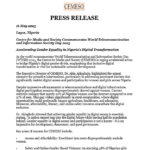Legal Framework
The legal framework for radio broadcasting in Nigeria has been defined by four major instruments: the Constitution, the Wireless Telegraphy Act of 1962, The Federal Radio Corporation Act of 1979 and the National Broadcasting Commission Act 38 of 1992 as amended by NBC Amendment Act 55 of 1999.
Constitutional Framework
Two constitutions stand out as groundbreakers in the development of the Nigerian broadcast sector: the McPherson colonial constitution of 1951 and the 1979 constitution. The former broke ranks with its predecessors by granting more autonomy to regional governments and putting broadcasting on the concurrent legislative list, that is, within the administrative jurisdiction of both the federal and regional governments. This development paved the way for the establishment of broadcasting outfits by regional governments and partly accounts for the expansion in state-owned broadcasting from the 1960s to the present day.
The 1979 constitution on the other hand, was the first to create an opening for private participation in ownership and management of radio broadcasting. Section 36(2) of the 1979 constitution provided that “every person shall be entitled to own, establish and operate any medium for the dissemination of information, ideas and opinions”.
It states further in the same sub-section 2 that “ no person other than government of the federation or of a state or any other person or body authorized by the President, shall own, establish or operate a television or wireless broadcasting station for any purpose whatsoever”.
Its postcolonial predecessors (the 1960 and 1963 constitutions) merely guaranteed the “right of every person to freedom of expression, including the freedom to hold opinions and to receive and impart ideas and information without interference”, but none of them provided for the right of persons to own, establish and run broadcast media.*1
But the successors to the 1979 constitution have followed in its footsteps on this issue of private participation and individuals’ right to broadcast ownership.
Indeed, the provision on this in the 1999 constitution, now in use, is a replica of the version in the 1979 constitution. The only difference is that the 1999 constitution contains a clause “on the fulfillment of conditions laid down by an Act of the National Assembly”, and while the provision lies in section 36 of the 1979 document, it occupies sections 39 in the 1999 constitution.
Wireless Telegraphy Act
Prior to the liberalization of the airwaves in 1992, the broadcast sector also operated under the Wireless Telegraphy Act.
The Act vested regulatory powers in the Minister as illustrated in the following provisions:
4(i) No persons shall establish or use any station for wireless telegraphy or install or use any apparatus for wireless telegraphy except under and in accordance with a licence in that behalf
5(i) No person shall offer for sale, sell or have in his possession with a view to sell in the course of his business any installation, mechanism, instrucment, material or other apparatus constructed for the purpose of or intended to be used for wireless telegraphy except under and in accordance with a licence in that behalf See Section 24 of the Constitution of the Federation, 1960 and section 25 of the 1963 constitution
6(i) The Minister may grant licences for the purpose of this Act in the prescribed form or in such other form for any particular case as he may approve and may renew licences so granted
6(2) The grant of a licence shall be in the discretion of the Minister
6(5) A licence may be revoked or the terms, provisions or limitations thereof varied, by a notice in writing of the Minister served on the holder of the licence or by a general notice applicable to licences published in the federal gazette.
29(1) In the discharge of the executive authority of the federation in relation to the allocation of wave lengths for wireless broadcasting and television transmission, the minister after consultation with the Director General of Communications, may grant to the government of a state licences to provide sound or television broadcasting service transmitting on such wavelengths as may be allocated.
While the Wireless Telegraphy Act restricts control of broadcasting to government, it nevertheless snatched away the concurrent powers granted the regions or states (second tier of government) under the colonial McPherson constitution, especially as the 1960 and 1963 constitutions were just silent on broadcast ownership.
This did not pose any problem during military rule because of the unitary nature of command which made licencing of state stations easy.
However, at the return of civil rule in 1979, when different political parties controlled the federal and many of the state governments, the latter had to exploit the extricatory powers of section 36 of the 1999 constitution to be able to establish their own broadcasting stations.
In all of these, public participation in ownership and operation of broadcasting remained on a long wait. No thanks to the Wireless Telegraphy Act and the National Mass Communication Policy which refused it, but also the government which refused to put a machinery in motion for the realization of the letter and spirit of the 1979 constitution.
The Federal Radio Corporation (FRCN) Act of 1979
The FRCN Decree (now FRCN Act because of democratization) was promulgated in 1979 to give legal effect to the establishment of the previous year to replace the Nigeria Broadcasting Corporation created by NBC ordinance 39 in 1956.
Within the framework of the FRCN Act, the corporation was asked to hand over all its state stations to state governments, and was then left with its original stations in Lagos, Ibadan and Enugu, which were joined by the Broadcasting Corporation of Northern Nigeria.
Despite the physical downsizing, and the provision in section 5(i) that the primary responsibility of the FRCN is to provide as a public service in the interest of Nigeria, independent and impartial broadcasting services, the Act produced negative effects which include: constricting state stations but giving national space monopoly to the FRCN, replacing the independent and public service status of the NBC Ordinance 39 of 1956 with excessive government (executive) control, and mandating pro-government programming.
Under the Act: (a) the corporation had exclusive authority to broadcast simultaneously in more than one state of the Federation at any once time on either short or medium wave. Radio stations not owned by the federal government were to restrict their coverage to their states of location and ownership.
b. Membership of the Corporations governing body consists of a chairman, the director general, one representative of each of the Ministry of Information and the Ministry of External Affairs, one person to represent women’s interests and six other persons with relevant experience in the following spheres of human endeavour: the mass media, education, management, financial matters, engineering, arts and culture. All the members including the chairman and Director General, are to be appointed by the Minister on the approval of National Council of Ministers.
c. Public officers who serve on the governing board serve an indefinite tenure while other members are restricted to a maximum of two terms of three years each. The minister has power to remove any member of the corporation from office on grounds of misconduct or inability to perform the functions of his office.
d.the corporation is required to broadcast, as desirable in the public interest, the speeches of members of both the Armed Forces Ruling Council (AFRC) and the National Council of Ministers, and any government programme upon the request of a public officer authorized to do so by the President, at its own expense.
e.the corporation should be financed through a fund which is to consist of such sums as may be provided to it by government and all other assets accruing to the corporation from time to time. These include funds that may be sent to the FRCN and such other sums as may be collected or received from other sources either in execution of its functions or in respect of any property it may have.
Commercial activities engaged in by the corporation are exempted from the payment of entertainment levies or other charges as may be payable to any state government.
The FRCN (Amendment) Decree strengthened government (executive) control over the corporation by stipulating that the Minister may give the FRCN directives not only of a general character but also relating to particular matters regarding the exercise by the corporation of its functions, and that the corporation must comply with such directives.
In a curious policy shift in 1982, the government directed the FRCN to establish stations in all the then existing 19 states of the country. But upon the return of the military to power in December 1983, the new stations were discontinued on grounds of non-viability and handed over to state governments.*1
The FRCN was made to shed further weight in 1990. Its 28-year-old international service, Voice of Nigeria, was excised and established as an autonomous corporation, formalized a year later, by Decree 14 of 1991.
For the third time, FRCN has returned to the regime of proliferation. In 2001, two years after the country returned to civil rule, the corporation embarked on a programme of establishing new FM stations in all 36 states and the federal capital territory.
Hence, today, the FRCN has five national stations and 37 state-based stations.
The National Broadcasting Commission Act
A major policy shift in 1992 led to the opening of the airwaves. The government promulgated the National Broadcasting Commission (NBC) Act – 38 which established a regulatory body, the NBC, and made provisions for private participation in ownership and management of broadcasting.
The legislation vested the commission with powers/functions which include:
• Advising the government generally on the implementation of the National Mass Communication Policy with particular reference to broadcasting
• Receiving, processing and considering applications for the ownership of radio and television stations including cable television services, direct satellite broadcast and any other medium of broadcasting (See Atilade, Atoyebi, The Origin of Radio Nigeria”, in Amadi & Atoyebi (eds), Radio Nigeria: Yesterday, Today and Tomorrow, Northwood Resources Limited, Abuja, 2001, pp 24 )
• Regulating and controlling the broadcast industry
• Undertaking research and development in the broadcast industry
• Receiving, considering and investigating complaints from individuals and bodies corporate or incorporate regarding the contents of a broadcast and the conduct of a broadcasting station;
• Establishing and discriminating a national broadcasting code and setting standards with regard to the contents and quality of materials for broadcast
• Promoting Nigerian indigenous cultures, moral and community life through broadcasting
• Promoting authenticated radio and television audience measurements and penetration
• Regulating ethical standards and technical excellence in public, private and commercial broadcast stations in Nigeria;
• Monitoring broadcasting for harmful emission, interference and illegal broadcasting
• Determing and applying sanctions including revocation of licences of defaulting stations which do not operate in accordance with the broadcast code and in the public interest
• Approving the transmitter power, location of stations, areas of coverage as well as regulate type of broadcast equipment to be used *
A subsidiary law, NBC (Amendment) Act 55, promulgated in 1999, brought radio stations owned by federal, state or local governments under the regulatory control of the NBC and added the following functions:
• Ensuring qualitative manpower development in the broadcasting industry by accrediting curricula and programmes for all tertiary training institutions that offer Mass Communication in relation to broadcasting
• Intervening and arbitrating in conflicts in the industry
• Ensuring strict adherence to the national laws, rules and regulations relating to the participation of foreign capital in relation to local capital in broadcasting
• Serving as national consultants on any legislative or regulatory issues on the broadcasting industry
The 1999 Amendment also inserted new provisions among which are:
• Inclusion of representatives of the Engineering profession, State Security Service and the Federal Ministry of Information on the board of the commission
• Empowering the commission to collect and disburse licence fees accruing from the ownership of radio and television sets
• Indemnity for the commission and its staff
The four legislations (1999 Constitution, the Wireless Telegraphy Act, the FRCN Act and the NBC Act as amended) have individual or collective effects that are inimical to the development of the broadcasting sector.
Section 39(2) of the constitution and section 2(1),(b) and (c ) of the NBC Act effectively remove full and final regulatory powers from the NBC, turning it into a mere processing house. The final approval power vested in the President consigns the licensing process to the culture of arbitrariness since it leaves the ultimate decision to his discretion.
The board members of the commission are appointed by the President. Not satisfied with this situation, the government included the representatives of the state security service (SSS) and Federal Ministry of Information as members via the amendment in Act 55 of 1999. All of the appointments are done without any involvement of stakeholders and no recourse to any transparency criteria. These put in place a regulatory body that is far from being independent and whose membership cannot be truly representative of industry stakeholders.
The Amendment Act of 199 vests the NBC with the power to collect and disburse licence fees accruing from the ownership of radio and television sets. But paragraph 1(6) of the fourth schedule to the 1999 constitution runs counter: it gives the powers to local governments. Because the constitution is superior, the balance tilts in favour of local governments.
Apart from the licencing fees and other sources of revenue available to the commission, the Act further makes provision for collection by the NBC of “such percentage of fees and levy to be charged by the commission on the annual income of licenced broadcasting stations”. When added to general business/operating taxes and licencing fees, these “fees and levy” are capable of destroying the entire broadcasting sector.
What is more, in all of these legislations there is no mention of, reference to nor provision to protect the interest of community broadcasting.















